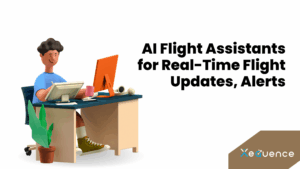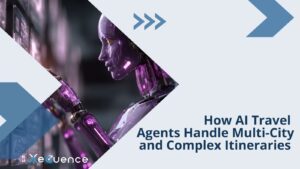- Home
- Uncategorized
- Hotels Leverage Gen AI for SEO and Content Marketing
Hotels Leverage Gen AI for SEO and Content Marketing
- November 28, 2024
- Shashi Kant
- Uncategorized

How Hotels Use Gen AI to Improve Content Marketing and SEO
Generative AI is a branch of artificial intelligence that can create fresh and unique content, including 3D models, music, writing, and photographs. Its ability to analyze large amounts of data is amazing. By using these insights, generative AI is able to produce original content that is consistent with the data it has been trained on and customized to meet particular needs. The hospitality sector, which is marked by fierce competition and a pressing demand for technical developments, has as its primary goal improving the consumer experience. Today’s consumers anticipate being able to use their mobile devices to handle tasks like checking out, buying tickets, and making reservations.
Why is generative AI crucial in modern hospitality?
By using generative AI, these procedures can be drastically changed, increasing customer pleasure, personalization, and reducing fraud. For the hospitality industry, where innovation in automated customer service is essential to preserving a competitive edge, this feature makes Gen AI a significant tool. Stakeholders in the hotel sector now need to integrate emerging generative AI technology. Using these technologies can help you stay up to date while also enhancing service quality to meet the needs of contemporary customers.
Role of AI in Hospitality Industry SEO
Artificial intelligence is essentially changing how SEO used to operate. Large volumes of data can be analyzed by businesses using AI-powered tools to identify trends, comprehend consumer behavior, and optimize their websites. The development of the hospitality sector would benefit greatly from this since AI will make it possible to identify trends, customize information, and improve the user experience on websites for hotels and restaurants.
What is the benefit of AI in Content Marketing?
Increased efficiency:
Content creation and distribution take a lot less time and effort thanks to AI. In a fraction of the time, a single individual can today frequently draft something that once took hours, days, or even weeks. Automated AI technologies can quickly produce and distribute marketing materials, freeing up hotel employees to concentrate on other aspects of guest service that AI cannot duplicate or replace.
Enhanced personalization + augmented concierge services:
AI may utilize data to assist in creating messages and recommendations that precisely relate to a visitor’s past and preferences, which could boost engagement, lead to booking upgrades, and foster loyalty.
Flexible scalability:
As small-sized hotels grow their businesses, they can easily expand their reach and marketing strategies with AI solutions. This is all without having to recruit more staff to handle content and execution, which would raise marketing costs.
Use Cases of Generative AI in the Hospitality Industry
Personalized Guest Experiences:
Generative artificial intelligence helps to examine past visits and preferences to provide customized suggestions for restaurants, services, and nearby attractions. A visitor who likes running outside or engaging in other outdoor activities, for example, might be given recommendations for local hiking routes or outdoor activities. Guests who are traveling with their families may get the opportunity to experience family-friendly local attractions.
Dynamic Pricing Strategies:
Most hotels use either in-house or contracted revenue management systems. In order to dynamically modify hotel rates, these revenue management systems use artificial intelligence (AI) to examine market trends, demand, and rival pricing. By doing this, revenue is increased, occupancy rates are raised, and competitive pricing is guaranteed.
Energy Management on the properties:
The AI technologies can optimize the hotel’s energy use by modifying the heating, cooling, and lighting according to weather forecasts and occupancy. In addition to cutting expenses, this supports sustainability initiatives.
Security and Surveillance:
AI algorithms are being used in security to monitor and record video in real-time, identify anomalous activity, and notify hotel employees. This will reduce the risk of security breaches at the sites and improve visitor safety.
Predictive Maintenance:
Hotel equipment data may be analyzed using generative AI to forecast maintenance requirements, lowering maintenance expenses and downtime. An illustration of this would be anticipating potential HVAC system failures and planning maintenance before they affect visitors and occupancy.
Options for In-Room Entertainment:
Hotels are already using AI to provide individualized entertainment in their rooms. The technology has the ability to recommend movies, music, and even gym regimens based on visitor interests.
Concierge Services:
AI-powered virtual concierges are available around-the-clock to assist visitors with reservations, questions, and information about nearby activities and hotel facilities.
Smart Room Service:
In order to improve the overall dining experience, hotels can use generative AI to predict client preferences for room service and provide personalized menus and timely recommendations.
Cleaning and Sanitization:
Using sensors, air quality, and volatile organic compounds (VOCs), artificial intelligence (AI) assists in scheduling and monitoring cleaning procedures to guarantee that rooms adhere to strict hygienic standards. Given that guests place a high value on cleanliness in the post-pandemic age, this is especially important.
Talent Management and Training:
By identifying skill gaps and providing hotel employees with individualized training programs, AI helps with talent management. This guarantees a team with a high level of expertise that can provide outstanding visitor experiences.
How does AI benefit to the hotel industry?
Improved Client Support:
With the help of AI and ML, hotels can now provide customer care that goes above and beyond expectations. Automated messaging and chatbots make it much easier to interact and communicate with customers before their check-in time happens. Hoteliers that use AI in the hotel business can gain from personalization through data collection.
Management of Revenue:
60% of visitors are satisfied with hotels’ revenue management, which is seen as the most effective use of AI and ML, according to the aforementioned survey. Among other things, machine learning technologies enable competitor monitoring, KPI tracking, market analysis and segmentation, intelligent pricing setting, and fully automated booking procedures. In addition to allowing them to provide their guests exceptional value, this keeps hotel owners competitive in the market.
Management of Online Reputation:
The fact that even the largest hotel businesses need help to keep up a fantastic online reputation may surprise you. In order to control their online reputations, more hotels are turning to artificial intelligence. 81% of travelers look at reviews before booking a hotel, according to a recent online review poll, making review management the most crucial component of online reputation management.
Information Analysis:
In the hotel sector, AI is used for general data analysis in addition to the previously listed areas. This entails managing inventory, analyzing consumer behavior, anticipating demand, projecting the market, and other operational tasks to ensure an excellent visitor experience. Furthermore, review management systems enable hotels to maintain contact with their guests through online review platforms even after they have left, providing them with thorough customer service.
Enhanced Output:
Artificial intelligence is not a replacement for humans, despite what some people think. By employing accurate problem-solving methodologies, hotels can better predict guest needs; enhance operational procedures, forecast customer behavior, and lower risk.
The Future of Hospitality with Generative AI
In conclusion, the hotel sector is already changing due to generative AI, which has limitless potential. Personalized, high-quality content at scale is made possible by hotels’ growing use of generative AI to optimize SEO and content marketing initiatives. AI technologies aid in raising search engine ranks and drawing in more focused visitors by improving consumer engagement and refining website. AI will play a bigger part in the hospitality sector as it develops, increasing productivity and client pleasure.
Recent Posts
5 Myths About AI in Hospitality Operations | Facts Every Hotelier Should Know
Newsletter
Get regular updates on data science, artificial intelligence, machine
You may also like

Al Flight Assistant Integration with Airline Reservation Systems

The Future of Hospitality Operations: AI Trends to Watch

AI Flight Assistants for Real-Time Flight Updates, Alerts




